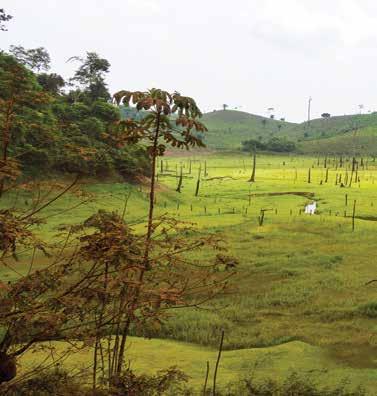
3 minute read
Responding to the “Cry of the Earth” by Daniel Imwalle
Responding to the “Cry of the Earth”
by Daniel Imwalle Adapted from an editorial in the February 2020 issue of St. Anthony Messenger
Advertisement
We humans tend to compartmentalize just about every aspect of our lives, from what we do in mundane daily rituals to how we engage with entire holy seasons. There’s comfort in routine, to be certain. The cycle of holidays, holy days, and commemorative months provides us with a kind of rhythm in an often offbeatworld. And we’ve likely already compartmentalized the health of our environment to Earth Day and the beginning of spring.
But what if we considered incorporating ecological awareness and stewardship into our daily life instead of one day a year? Doing so connects strongly with our faith’s call to care for God’s creation and could very well surprise us with new ways to grow in our spiritual lives. Recent developments in the Church and renewed calls for ecological conversion shed light on the importance of care for creation.
Our Earth Cries Out Taking care of the earth is not new to Catholic social teaching. In a 1971 apostolic letter, Pope Paul VI wrote, “Man is suddenly becoming aware that by an ill-considered exploitation of nature he risks destroying it and becoming in his turn the victim of this degradation” (“Octogesima Adveniens,” 21). St. John Paul II and Pope Emeritus Benedict XVI furthered the cause for ecological preservation in their papacies, and the primary focus of Pope Francis’ second encyclical (“Laudato Si’”) is our moral obligation to care for creation and respond to climate change.
Perhaps nowhere is the evidence of humankind’s abuse of the environment more apparent than the Amazon rain forest. Often referred to as “the earth’s lungs,” this vibrant and diverse ecosystem is facing an epic crisis. By 2018, after decades of deforestation, about 17 percent of the rain forest had been destroyed, primarily to make way for lucrative cattle ranches. The “slash-andburn” method of deforesting has led to ongoing wildfires in the region. Following the discovery of fossil fuel reservoirs in the 1970s, it has been an uphill battle for many indigenous groups to keep oil companies from entering the Amazon and destroying more forest by building roads and setting up drill sites.
The Synod of Bishops for the Pan-Amazon Region that met last October made a strong link between poverty of people and poverty of the earth. Part of the final document of the synod reads, “Listening to the cry of the earth and the cry of the poor and of the peoples of the Amazon with whom we walk, calls us to a true integral conversion, to a simple and modest style of life, all
Our moral obligation is to care for creation.

nourished by a mystical spirituality in the style of St. Francis of Assisi, a model of integral conversion lived with Christian happiness and joy” (17).
Caring for creation doesn’t have an impact only on those living in poverty who work the land; it’s intertwined with the ongoing conversions that are a part of all of our faith journeys. If we allow ourselves to be moved by the “cry of the earth.”
Practicing What We Preach
The immense problems facing the environment are on a global scale, and, considering the size and complexity of the crisis, we might be tempted to simply give up before even trying. We need to be patient with ourselves—and with others—as we find out what’s within our sphere of influence. Starting small is always OK.
Set recurring reminders on your phone to offer up a quick prayer for our earth. It could be a prayer of gratitude, for solidarity with the 700 million people struggling with water scarcity, or a few lines from St. Francis’ “Canticle of the Sun.” With a calendar at hand, try making some weekly goals.
Money holds many of us back from happiness and holiness. Letting go of some in the form of a donation is a very Lenten exercise. Organizations such as the Catholic Climate Covenant (CatholicClimateCovenant.org) and Poverty USA (PovertyUSA.org) are great educational resources that also make donating easy.
Pope Francis wrote in “Laudato Si’” about the environmental crisis, “A great cultural, spiritual, and educational challenge stands before us, and it will demand that we set out on the long path of renewal” (202). Taking to heart the pope’s words, now is the time to take up that journey.
An American tradition! Published monthly by the Franciscan Friars of St. John the Baptist Province, your subscription to St. Anthony Messenger helps Franciscans to evangelize. Go to StAnthonyMessenger.org to learn more.










